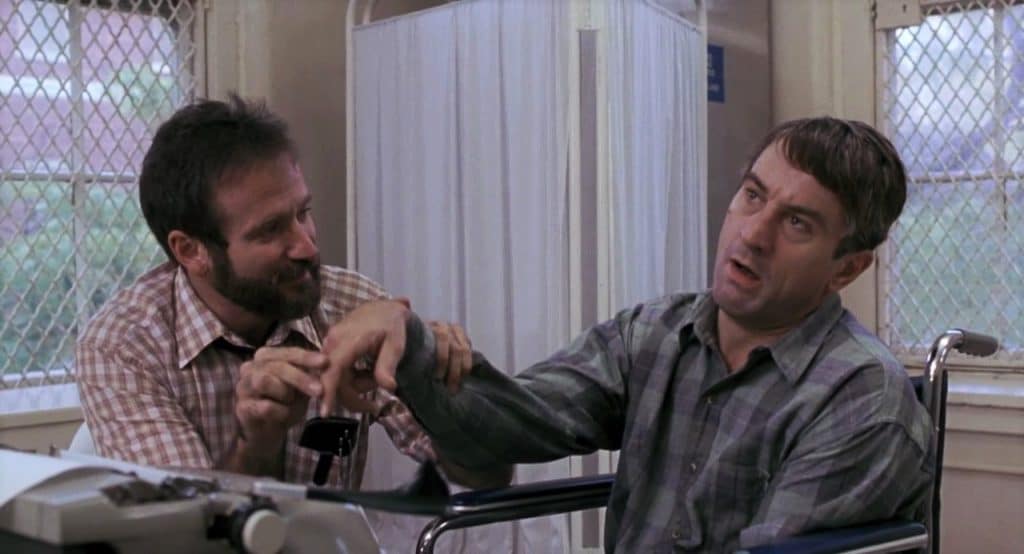A wonderful film that is sweet and melancholy without being sentimental, with two phenomenal performances by Robin Williams and Robert de Niro
Awakenings (1990)
Directed by Lorenzo Vigas. Written by Penny Marshall. Screenplay by Steven Zaillian, based on “Awakenings” by Oliver Sacks. Starring Robert de Niro, Robin Williams, Julie Kavner, Ruth Nelson, John Heard, Penelope Ann Miller, Alice Drummond and Max von Sydow.
British neurologist and author Dr. Oliver Sacks (1933–2015) was a man deeply fascinated by the complexities of the human mind. “The brain is the most incredible thing in the universe,” he once said. Maybe he was right; the brain is a box of chocolates, so full of secrets. Scientists have done a fantastic job to unravel many of them, but there are just as many that we still can’t grasp. The further we probe into the mysteries of our mind, the more we realize what a beautiful computer full of intricacies it is. Perhaps when Sacks wrote his non-fiction book Awakenings in 1973, he was well aware of that and needed to detail his experiences with some of his neurological patients in an effort to understand more about himself too.
In the book, adapted thirteen years later into this wonderful Oscar-nominated film, he recounts how in 1969 he went to work at the Beth Abraham Hospital in the Bronx, New York, and tried to help catatonic victims of the 1920s encephalitis lethargica epidemic. This atypical form of encephalitis (whose cause is still unknown) affected nearly five million people worldwide from 1917 to 1928, a third of whom died in the acute stages. It wasn’t after decades of living normal lives that they started to develop Parkinson’s‑like symptoms, such as rigid postures and frozen gaze. They became like living statues. As Sacks wrote: “They neither conveyed nor felt the feeling of life; they were as insubstantial as ghosts, and as passive as zombies.”
Sacks then decided to administer on one of the patients an experimental drug called L‑DOPA, a synthetic dopamine used in the clinical treatment of Parkinson’s disease. Despite being a drug made for other ends, the result was absolutely surprising. The patient broke out of his catatonic state and Sacks asked for funding from donors to try the drug on all his other patients and “awaken” them back to reality. His whole experience with these patients is described in his book and this film, adapted by Steven Zaillian (who was nominated for an Oscar and three years later won the award for Schindler’s List) and directed by Penny Marshall.
Zaillian’s script is at the core of Awakenings. From several short chapters about different patients, he creates a linear narrative that moves carefully and unhurriedly. When Dr. Malcolm Sayer (Robin Williams), Sacks’ alter ego, is hired as a clinical physician at the hospital, he is initially very uncomfortable, given his background as a researcher and difficulty working with people. But things start to change when he notices that the patients are able to respond to certain stimuli, such as a familiar song or a ball thrown at them, or even communicate using a Ouija board. It is not just curiosity that drives Sayer but his profound care for people.
This love and care for others is embraced by Robin Williams in what is arguably the most human performance of his entire career. His eyes are so full of kindness and sensibility that we fall in love with him. Physically, he even resembles Sacks to a shocking degree, capturing his shyness and conveying with sheer perfection how hard it is for him to relate to other people in a more personal level. His delicate composition is a wonder to behold, as he fleshes out a man who prefers the order of things to the unpredictability of people. It is one of those great injustices of the universe that Williams didn’t receive an Oscar nomination.
But if Williams shines in a restrained performance, Robert de Niro impresses perhaps even more as Leonard Lowe, the first patient who wakes up after living for thirty years in a vegetative state. From that moment on, we see Leonard gradually start to talk and behave like a functional, healthy person, and the way that de Niro shows this evolution is phenomenal. A method actor such as he is, he completely embraces the hurrying gait, the tics, tremors and other symptoms of the disease, especially when Leonard tries to control himself before going on a date with another patient’s daughter. It is magnificent.
The moral center of Awakenings is precisely Leonard, who struggles to come to grips with the fact that he has been sleeping for most of his life. Needless to say, it must be a real shock to look at yourself in the mirror and see a much older face that you cannot recognize. But as he points out, some people just spend their whole lives not living them. What excuse do they have? For Leonard, the value of life is in the simplest things: “All the things that you people take for granted,” he says. When money seems to be sometimes more important than people, it is beautiful and uplifting to discover goodness in those who care.
Finding space for humor and lightness (like the scene at a dance room) while remaining always delicate, Penny Marshall creates a film that is sweet, melancholy and mature without being sentimental. Most of all, I love how she creates a thematic parallel between a real prison (the iron bars of the hospital or those of a panther’s cage) and the physical prison of a disease that kept those unfortunate patients locked in their own bodies for so many years. A tragic blow from fate that seems to be perfectly described by the words of Rainer Maria Rilke:
“Only at times the pupil’s curtain slides
up soundlessly — . An image enters then,
goes through the tensioned stillness of the limbs —
and in the heart ceases to be.”





